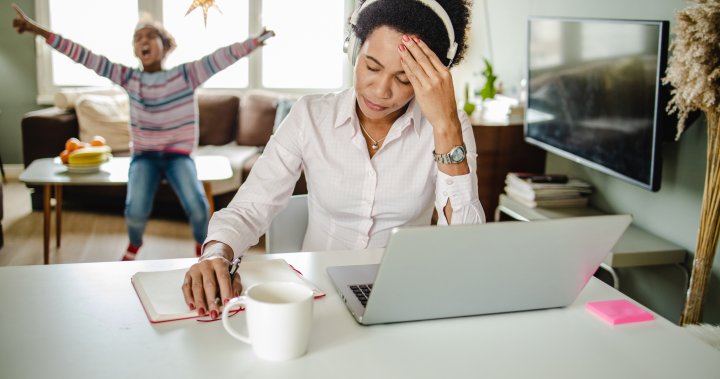When the government of Ontario announced the extension of elementary school closures earlier this month, Jennifer Azevedo says she almost burst into tears.
Azevedo, a mother of two children, has been working from home since last year and says she feels exhausted from work, homeschooling and life.
She adds she also feels guilty almost every day.
“I feel guilty for not spending enough time with (my kids). Even at the end of the day when work and school are done, I feel guilty because I don’t have the energy to play with them,” Azevedo says.
“There’s no balance of anything right now. Everything’s complete chaos.”
Since the beginning of the COVID-19 pandemic, parents have been struggling to homeschool their kids, cook healthy meals and manage their children’s screen time — all while working and trying to maintain their mental health.
People need to change their parenting expectations and drop the guilt in 2021, experts say.
“Parents have been feeling guilty because they’ve been asked to shoulder an impossible load,” says Ann Douglas, Canadian author of Happy Parents, Happy Kids.
Douglas, who also writes an advice column, says she’s watched parents scrambling to meet the needs of a toddler during a Zoom call, or provide technical support for a child learning remotely.
“Time and time again, parents have told me, ‘It doesn’t matter what I’m doing, I always feel like I’m letting someone in my life down,’” she says, adding that parents have been saying and doing things they regret because they’re stressed.
“Give yourself permission to be a gloriously imperfect parent and your child permission to be a gloriously imperfect child.”
Julie Romanowski, a Vancouver-based parenting coach and consultant, says people have made adjustments around schooling, work and social activities, but few people have adjusted their parenting expectations.
She adds that stress can manifest in the body, which puts parents at greater risk of mental or physical health issues.
A 2018 BPI Network survey, found that 63 per cent of parents in Canada and the United States experienced parental burnout. Of those parents, 40 per cent said it significantly affected their productivity, anxiety and depression.
Romanowski says that even if your family is having more frozen foods, TV time or screen time, you should remember parenting styles during a pandemic are just temporary.
“Not to say you get a free pass … but take it easy on yourself. Have some compassion,” she says.
Echoing her sentiment, Natalie Preddie, a Toronto-based travel and lifestyle writer, says we need to give ourselves a break and stop judging ourselves.
Preddie, a mother of three sons, had her youngest child in September 2020.
“Everything I thought I knew about parenting feels like it doesn’t count,” she says.
Preddie adds that when feelings of guilt arise, she uses “exercise as medicine” and remembers to lower her expectations.

Toronto-based family counsellor Alyson Schafer says when you’re feeling guilty, check in with yourself and establish if the guilt stems from an “old rule,” or a rule you had pre-pandemic.
As an example, Schafer points to kids’ increase in screen time.
The “old rule” would be to limit that time because some parents see it as a distraction or a hindrance to a child’s development, she says.
Now, Schafer adds, we need to create “reasonable rules” and reframe screen time as socialization.
“If they are hanging out with friends, like the girls watching Grey’s Anatomy or doing a virtual sleepover, I wouldn’t count that as like screen time per se — that’s them hanging out with their friends.”
She adds that boys playing video games are often wearing headphones and conversing, as well as learning about teamwork.
Schafer says since schools, malls and movie theatres are closed in some provinces, we need to find the equivalent social development task at home.
“And we can renegotiate these situations and call for new limits and boundaries when the pandemic is over.”
For parents who feel like their kids are falling behind in school, Schafer recommends checking in with the teacher and asking what the minimum expectations are.
“Doing the minimum is enough when you take into account you’re juggling three kids — all being homeschooled — while working and trying to provide,” she says.
Romanowski adds that if a child was doing well in their studies before the COVID-19 pandemic, they’ll most likely get back to that same level.

Romanowski says we need to accept where our children are at, even if your child has put off university or going to work, adding that the pandemic has shifted many of our plans.
She also recommends building your support system — whether that be in Facebook groups, your neighbours or other parents from your child’s school — because most parents are going through the same thing.
Lastly, Romanowski says you should seek professional help if you feel like you’ve exhausted your resources.
“Even telling your family doctor you’re struggling can have positive results.”
Read more:
Co-parenting in the COVID-19 crisis
Shafer adds that parents are learning so much more about their children, in ways that weren’t possible without spending so much time together.
“I think it will shift how our families function after the pandemic and I think that’s a good thing,” she says.
© 2021 Global News, a division of Corus Entertainment Inc.


